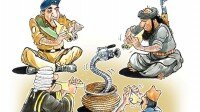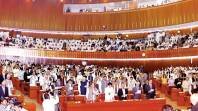The year 2014 promises to be different from its predecessor in one fundamental way: where 2013 was driven by big political events, the coming year may be defined more by policy. Unless, of course, big events decide to happen without warning, which they normally do.
2013 was a roller-coaster year for Pakistan, ushering in new governments and new decision-makers in positions of power and influence. In this respect, it was a year that saw major – and smooth – transitions taking place, setting the country on to surer footing. 2014 then should see the fruits of these important transitions materializing into public view. The year will also see key institutions gradually re-defining their spheres of influence as fresh leadership sets fresh course for them. In essence then, 2014 should consolidate the gains of 2013.
For Nawaz Sharif and his government, 2014 will present major challenges. These challenges will in many respects define the political prowess, or lack thereof, of the Sharifs. Swept into power riding a wave of expectations, and widely expected to introduce efficient governance after the disastrous PPP years, the PMLN and its leadership is yet to prove its credentials. Six months in power have hardly produced any noteworthy results, and expectations are giving way to boredom. Not the most exciting of leaders at the best of times, Nawaz Sharif in his third stint as prime minister has turned out to be cautious and brooding prime minister sourly missing the common man’s touch. A generous view would accord 2013 to him as his honeymoon period, which basically means that as the clock chimes midnight on December 31, it will mark the beginning of Sharif’s real innings. No more free hits.
His To-Do list is long. Electricity woes. Check. Depleting gas. Check. Mounting Circular debt. Check. Bleeding Public Sector Enterprises. Check. And of course the mother of all issues: terrorism. On all these issues we have heard a lot of good intentions, some announcements, a few initiatives and some concrete work whose results are still awaited. All governments kick off their terms with noble intents and grandiose plans. Then reality comes and chews off the juicy parts.
The ravages of reality can be tempered by performance. For Nawaz Sharif, the time for such performance has arrived. The next twelve months will need to see concrete and substantive progress on key challenges, failing which dashed expectations, mounting political pressure from the Opposition and a weakening economy will start to take a heavy toll on the Sharif government.
The physical toll will be greater. And this hinges on what the prime minister does (or not) in combating terrorism. One of the most important – and difficult - decision that he will have to take will be on whether to appease the TTP or take the fight to them. Talk about talks with the TTP dominated political discourse in 2013, thanks mainly to the confused but predictable rhetoric of PTI, JUI and Jamaat. Locked into a possible Stockholm Syndrome – where hostages start to relate to their kidnappers – these Rightist parties whipped up a sentiment that obliterated any chances of a consensus on battling terrorists. By the looks of it, the attempt to talk sense with these terrorists will fail. That is when Sharif’s real mettle will be tested. He will have to muster political courage and make the call. In all likelihood, this moment will come this coming year.
And it just so happens that 2014 is when the long-awaited withdrawal of the ISAF-NATO forces begins from Afghanistan, throwing up a host of challenges for the United States, Afghanistan and Pakistan. Unlike the PPP leadership, Sharif appears inclined to take control of the Afghan policy. In the high stakes game – come war or peace – Islamabad will remain in the eye of the storm. 2014 will decide if our leadership has finally decided to make a break with the disastrous policies of the past, or still stays wedded to a thinking that harks back to the future.
This state of affairs will also put to test the crucial civil-military relations in Pakistan. The army leadership has been managing the Afghan policy since Soviet tanks rumbled into Afghanistan in 1979. After thirty five years, an elected prime minister is making a serious effort to snatch back a prerogative which is constitutionally his. He is helped by the fact that a new army chief sits in GHQ. Will the army take a step back, or will it resist civilian ingress into an area it considers its own? 2014 will see this predicament playing out in living colour. The consequences will be far reaching, not just for Islamabad’s Afghan policy but for the future of democracy and civilian supremacy in Pakistan.
A crucial year then stares us in the face. If things play out well; if the leadership stays the course, performs well and takes the right decisions; and if luck smiles on Pakistan, we could be headed towards consolidating our gains and learning from our mistakes. These are big ifs, and usually these ifs come with buts, so the best we can do as a new year dawns, is to keep our fingers crossed.
The writer is Director News, Express News. He tweets @fahdhusain
























